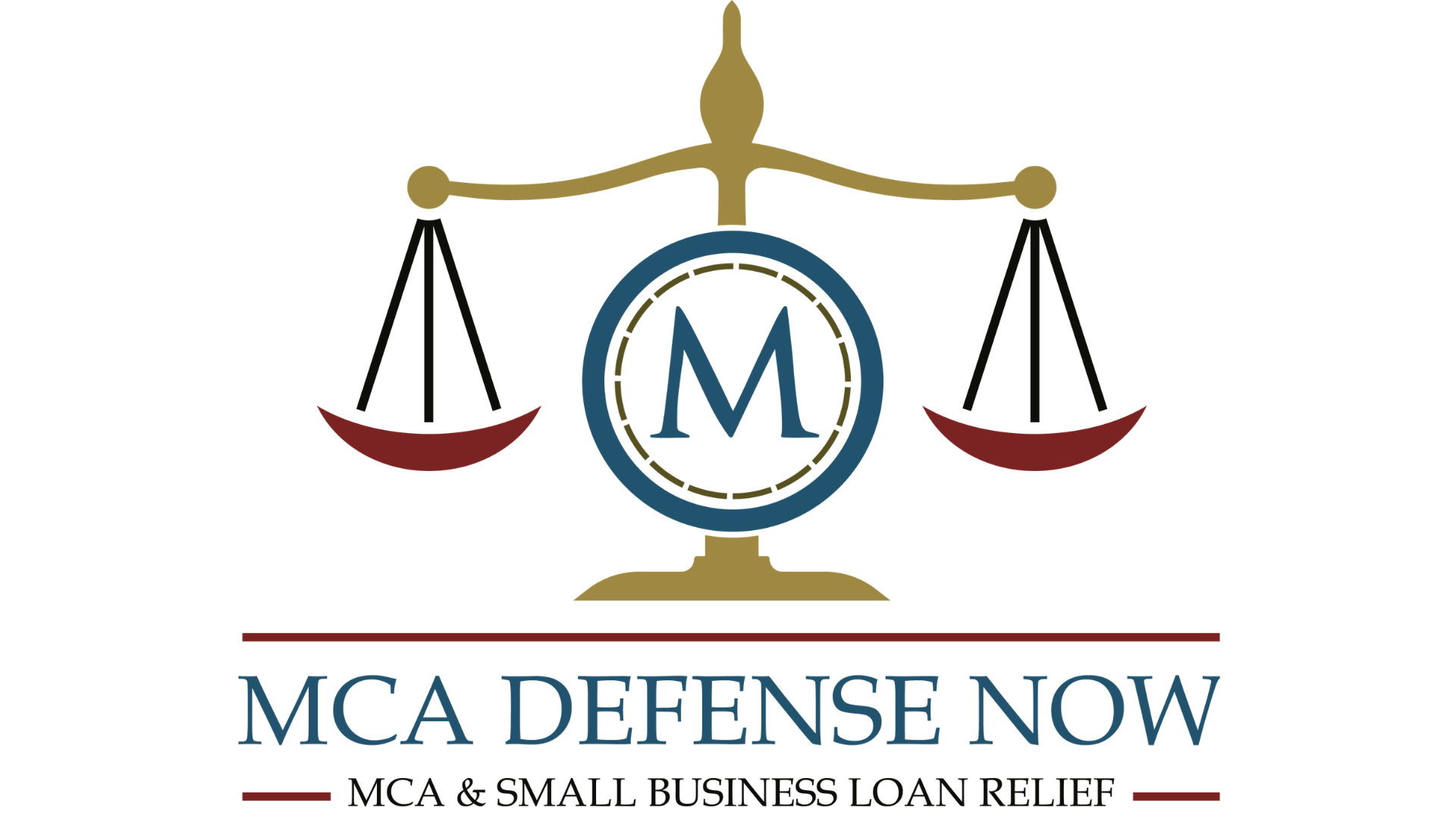5 Risks Involved When Defaulting on Your Merchant Cash Advance Loan
MCA Defense Admin • January 13, 2021
Risks Involved When Defaulting on Your Merchant Cash Advance
A merchant cash advance loan is a choice many small business owners make. Those loans are a great way of obtaining extra cash to get through a slow time in their business. There is no collateral required, which makes them an ideal option.
MCA loans are a growing industry, but also have a high default rate. For this reason, about 10% of every payment you make to the lender is channeled into a "default reserve account." This account allows them to mitigate losses in the event you default the loan.
There are many risks to a merchant cash advance loan that can result in your inability to repay the cash advance. Read on to learn about these types of loans and their downfalls.
What Is a Merchant Cash Advance Loan?
Merchant Cash Advance, also known as MCA loans, became popular beginning in 2009. That was when it became more difficult for small businesses to obtain loans from banks. The purpose of these loans is to help the business float for a while until business kicks back in. The loan is not through a bank, but rather through a finance company that provides you with cash without physical collateral. What they do require is a percentage of your future sales. It is faster to receive your advance than it is when taking out a traditional business loan, but it comes with higher costs and riskier repayment schedules.
1. Merchant Cash Advances Are Not Loans
An MCA is not a loan, it is a cash advance, and therefore does not fall under the same law as loans do. This means they do not have a requirement for specific disclosures. One of the disclosures a bank must provide but a cash advance service does not is the interest rate.
The cash advance lender may also include in the contract judgment clauses that allow them to remove funds from your business bank account without court permission. The lender may file a lien against your business, file a report with credit bureaus, and more.
A 2018 Federal Reserve Report reveals that MCA loans are confusing for borrowers for several reasons, including:
The description of a merchant cash advance is confusing and vague
MCA industry language is confusing
The true cost of the loan is difficult to determine
Consumers are likely to make false assumptions about the cash advance experience due to prior experience with traditional bank loans
Rather than being federally regulated, the regulation for MCAs is through each state’s Uniform Commercial Code. They are not subject to banking laws, such as the Truth in Lending Act. This means you as a borrower have no protection against unfair lending practices when using merchant cash advance services.
2. High-Interest Rates and Short Repayment Periods
While it may seem easy to receive approval for an MCA loan, their interest rates are exceptionally high and the repayment schedule difficult to maintain. In the majority of cases, the business will have to pay an annual percentage rate of 40% to 350%. With such high-interest rates, you could end up owing thousands of dollars for borrowing money for a very short period of time. This puts your business at risk of sinking farther into debt, rather than making a recovery. Compare the MCA rate to the national annual percentage rate (APR) on standard personal loans with a percentage rate of 9.34%, payable in 24 months. It is clear that MCA loans are exorbitantly expensive. Say for example you borrow $100,000 from a bank on a 5-year fixed-rate loan. You will have a locked-in interest rate and know what your payment is each month. That payment will remain the same throughout the duration of the loan. If you borrow that same $100,000 through merchant cash advance services, your loan will likely have to be paid off within a 12-month period. You will not have a locked-in interest rate, and the lender will be withdrawing a high percentage of your business income on a daily or monthly basis. Your payments will float up and down along with your business revenue.
3. Flexible No-Rate Clause
If your Merchant Cash Advance Loan has a flexible no-rate clause, the lender may adjust the percentage that is taken from your account daily. If your business goes through slow periods or is seasonal this may cause problems with your cash flow.
Because there are no regulations on the percentage they take, you may need to look at other small loan options that will reduce your monthly payment. This is a time when speaking with an MCA Defense Now agent can help prevent you from losing your business because of unfair loan practices.
4. Adding and Increasing Fees and Penalties
Because these loans are not regulated through the banks, the lender may be able to add fees, seize your property, or increase the interest rate if you are unable to make your payments. In some instances, cash advances have “borrowers fees.”
Every month that the business does not make a payment there is an additional charge. Other charges that may be arbitrarily tacked onto the loan include late fees, penalties, daily default payment fees.
5. You May Fall Deeper in Debt
When a business is short on cash, and then forfeits a high percentage of their daily revenue into repaying a merchant cash advance loan, they may find themselves once again short of funds. When this happens, some cash advance services will offer them an additional cash advance. This is known as stacking. The stacking of MCA loans is a business trap that can leave you floundering in debt, unable to recover. You end up with numerous repayment demands from your incoming cash, and the result likely will be more than the business can handle. Stacking increases your risk of defaulting on your MCA loans, leading to even more problems.
Risk Resolution
When you are at risk of defaulting on your Merchant Cash Advance Loan you need to contact MCA Defense Now. We operate as a referral agency working with the top debt and MCA defense attorneys in New York.
When you contact our office, we provide you with relief services that allow you to keep your business running while repaying your debt. You will work with an experienced merchant cash advance attorney who will assess your debt and guide you on the best way to reach a favorable resolution. Please contact us at 877-347-7007 to speak with one of our representatives. You also have the option of completing our online form. Don't run the risk of losing your business, call us today!

Business owners must ensure that their businesses run smoothly and with proper capital. For that reason, many of them take up a "merchant cash advance" to offset some early costs. This can, however, put many people in serious debt on occasion. In that situation, having a dedicated merchant cash advance attorney on your side can really help with problems you may face. Many people do not know quite how an MCA lawyer can help them with the problems merchant cash advances can bring. So below are five ways an MCA attorney can directly assist you in resolving issues you may have. What Is a Merchant Cash Advance? For those who do not know, a merchant cash advance is a specific method of attaining capital to start a business. It is also used to offset sudden debts. It allows a trader to either get an upfront loan in exchange for a portion of future credit and debit card sales. Alternatively, you can get the same loan and repay it via direct daily or weekly debits. The history of merchant cash advances is heavily tied to companies who attain most of their revenue from credit and debit card sales. In recent times, other businesses have had access to them. This has meant their problems have grown as merchants make use of this lending scheme. These advances have allowed many merchants to get started with their business quickly. But in recent times, due to the coronavirus, the number of businesses getting into trouble over the loans has skyrocketed. This is where a merchant cash advance lawyer can step in and prevent the problems from getting worse. 1. Get a Merchant Cash Advance Attorney to Prevent Harassment Merchant cash advance lenders can be extremely aggressive in their marketing. This tenacity does not stop once an individual has attained an advance, however. Once someone misses a payment, the lenders regularly follow up on the missed payments with impunity. In a worst-case scenario, a trader may have signed a “Confession of Judgement” as part of the process. Such a confession allows lenders to seize assets even when no default has occurred. This leads to confusion and further problems for the person who has borrowed the money. Alternatively, a default may have occurred, and the lender may be following up, despite the situation not yet calling for such action. An MCA attorney can help you by first reading over your contract and advising you on your legal options. After this, they may be able to apply various legal methods to prevent the lenders from harassing you. At the very least, they may be able to offer support with how the law can help protect you in the long-term. 2. Unfreeze Your Accounts It may be that you find your payment processing accounts have been frozen. In this situation, an MCA attorney will be able to look at your contract with your payment regulator. With this knowledge, they will be able to define the easiest way to unfreeze the accounts. If the accounts are not yet frozen, a merchant cash advance lawyer should be able to give you some advice. You will then be able to avoid this in the future. Taking action before a problem occurs is always a good idea. A qualified individual can put you in the best position to do so. 3. Reduce Payouts When Talking About Your MCA You should be aware of the difference between payouts and interest. If your payouts are set at 20%, this does not mean a monthly or yearly increase to what you have been lent by 20%. That is interest. Instead, it refers to the percentage of your future sales that will go toward paying for the loan. This confusion can lead to overly aggressive — or inappropriately low — payouts. Should either happen, you will want to go back to the lender and discuss how you can both adjust the contract for everybody’s benefit. With an MCA lawyer on your side, you will have the legal know-how and ability to get to the negotiating table. Acting in your best interest, the attorney can approach your lender and discuss alternative options. Through this, they will be able to ensure you can repay the advance while also maintaining your business. 4. Negotiate Interest Rates When talking about your contract, you may find that your payouts are just fine. Instead, you might discover your yearly interest far outstrips what you can provide. Similar to reducing payouts, an MCA law firm can discuss the finer points of a contract on your behalf. Should you find your interest rates are too high, they may be able to define a new contract that works for you. You need not worry about inflating interest rates, or them changing without your permission. 5. Restore a Damaged Reputation Through the actions of a lender, you may find that others in your community start to distrust you. They may besmirch your ability to save money or make other inappropriate comments. This is not your fault and may even be a case of the lender engaging in slander or libel. This is definitely something you should mention to an attorney. A qualified merchant cash advance attorney can discuss with you what slander and libel are. They can then discuss issuing cease and desist letters if necessary, among other options. They will act according to your instructions after you understand the pros and cons of the decision. We Can Help There are a great many merchant cash advance attorney firms around. All of them will give you slightly different advice, depending on their expertise, and can either be a good or bad fit for you. Fortunately, we can help you trawl through the options. You can pick a firm with the right attitude and experience to help you ensure your business's safety going forward. Simply send us a message or give us a call and we will take the time to get back to you quickly.

Merchant cash advance loans are often seen as a great way for a business to get a little bit of cash to keep them afloat when they’re going through a rough spot. While this may be true, there are downsides to merchant cash advance loans as well, like the potential for a merchant cash advance default. Before getting one, small business owners may want to consider the pros and cons to make sure it is a good option for their business. Get Money Fast MCA's are a way for business owners to get money fast. The application is usually simple, and the money can be given to the business owner in just a few days. Business owners can request the amount of money they need to stay afloat or to help the business expand, depending on the reason for the loan request. Money Still Due, Even When Income is Low In most cases, the merchant cash advance loan won’t be flexible as far as repayments go. The daily, weekly, or monthly amount due will be the same amount every period until the loan is repaid, even if the business goes through another low spot. If the business is struggling and the owner cannot pay the loan, they may end up facing a merchant cash advance breach of contract and may need to hire an MCA attorney to help them get out of default and fix the issue. No Collateral Needed With these loans, there’s no need for collateral, so it’s easy for just about any business owner to obtain a merchant cash advance loan. They will need to go through the application process, but it is highly likely the business owner will be approved for a loan and will be able to get the cash advance they need for the business. Potential Risks of Default The biggest downside to these loans is what happens if there is a default on the loan . If the business owner can’t pay, they could face a frozen bank account as well as a bank levy or bank restraints. Along with the potential for bank levies, they could face UCC liens and other issues. This will not go away, and they will still owe the original amount of the loan, as well as all of the interest and other penalties. If you are considering a merchant cash advance loan, make sure you understand the benefits as well as the risks. If you have already received a loan and you’re worried about defaulting, contact a merchant cash advance lawyer for help right away. They can help you take care of the merchant cash advance legal issues as well as provide advice for moving forward.

No business in America escaped the effects of the global pandemic. Unemployment skyrocketed, consumer confidence dropped, and the GDP contracted. Experts anticipate the country will feel the effects of the pandemic for years to come, and nobody can predict the obstacles business owners might still face. Saving Funds Merchant cash advance companies quickly discovered many clients could not make their payments as agreed. They witnessed the detrimental effects of the pandemic sooner than most other businesses today. Their clients opted to prioritize debts and save their cash, hoping to save their business in a time of uncertainty. The MCAs weren’t affected, as they automate the payments. Nevertheless, they did witness a decline in payments in the months of March, April, and May, and this trend continues today. Fortunately, attorneys work with clients who find they are in this difficult situation, which also helps MCAs. Modification Requests Many clients called and requested modifications to avoid collection activities. Small business owners wish to avoid merchant cash advance legal issues, bank restraints, frozen bank accounts , and more. Fortunately, MCAs wanted to avoid taking actions such as these. They recognized a merchant cash advance default hurt their business as well because it would force them to take legal action. Pursuing bank levies, UCC liens, and things of that nature take time away from their businesses. As a result, they have been willing to work with clients or a client’s merchant cash advance attorney to avoid a merchant cash advance breach of contract. Helping Clients in Need Fortunately, merchant cash advance providers find they have opportunities to help business owners during this troublesome time. While the government stepped in and attempted to help small businesses across the country, bureaucracies work slowly, and many business owners found they needed funds before the government could provide them. Banks helped corporations get the funds they needed to continue operations, but overlooked small business owners when doing so. This is where merchant cash advance providers stepped in to help. Some companies borrowed money at that time only to discover the pandemic lasted longer than they anticipated and they can’t repay the funds. Merchant cash advance attorneys help clients work out an arrangement with the MCA to resolve the issue. Time is of the Essence Business owners find merchant cash advance businesses help companies in need of funds and do so rapidly. Often, these business owners find they have funds in hand in a matter of days. Small business owners remain the backbone of the American economy, and small businesses make up 45 percent of the country’s GDP, with the majority employing less than 20 workers. Merchant cash advance businesses stand ready to help these companies during this tough time. Unemployment numbers are on the decline, many states appear to be getting control of the virus, and the economy looks like it is rebounding. The funds provided by these providers help business owners make it over the hump and get back on their feet once again where they belong. When a business owner uses this service and finds they cannot pay as agreed, merchant cash attorneys can be of assistance. They work with clients and MCAs to reach an agreement that is favorable to all. If you are experiencing difficulty keeping up with your current MCA obligation or have fallen behind on any other business loans MCA Defense Now can help. Please contact us today for your free consultation.



